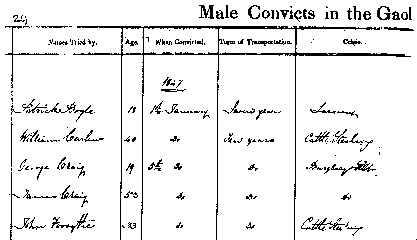The following is a very brief historical outline of the transportation of convicts from Ireland to Australia in the 19th century.
Following the American War of Independence, a new destination was sought for the transportation of convicts from Britain and Ireland 'beyond the seas'. On 13 May 1787, the first fleet bound for Sydney Cove with a complement of convicts, sailed from Portsmouth in England. Its arrival on 26 January 1788 marks the foundation of the colony of New South Wales. The first ship to sail directly from Ireland carrying convicts under sentence of transportation was the Queen, which arrived in Port Jackson on 26 September 1791.
Transportation from Ireland to Australia effectively came to an end in 1853. The last ship to carry convicts directly from Ireland to Australia was the Phoebe Dunbar, which sailed from Kingstown (now Dun Laoghaire) near Dublin and arrived in Western Australia on 30 August 1853. During the 62 years of transportation from Ireland to Australia, some 30,000 men and 9,000 women were sent as convicts to Australia for a minimum period of seven years - many more followed their loved ones as free settlers to a new life in the colony.
Transportation sentences were for periods of seven years (the most common), ten years, fourteen years or life. The nature of the sentencing policy behind these terms has not been fully researched. Linked with political conflict and agrarian unrest, the view that Irish men and women were transported for trivial first offences such as petty theft, has become part of Irish tradition.
Below: a portion of a page from a Transportion Register (TR6) 1827

The sentence of transportation was abolished in July 1857 under an Act of that year, but the Act allowed for convicts sentenced to penal servitude to be sent 'beyond the seas'. By this means, transportation continued from England until 1868. As far as is known, nobody convicted of a crime committed in Ireland was transported to Australia between 1853 and 1868, although no doubt some persons of Irish birth or origin who were convicted of crimes committed in England were among those transported to Australia. However in 1868 sixty three Irish Fenians who had been convicted in Ireland but imprisoned in England were transported from England. They arrived in Western Australia on 9 January 1868 on board the Hougoumont, the last convict transport ship to sail from England to Australia.
Additional resources
- The article Sources in the National Archives for research into the transportation of Irish convicts to Australia (1791-1853) by Rena Lohan (also available to download in .pdf format)
- The online transportation records database
- Convicts to Australia - a site dedicated to this subject
- Rena Lohan, 'The management of female convicts sentenced to transportation and penal servitude 1790-1898', (unpublished TCD thesis, 1989) pp 1-13
- Portia Robinson, 'From Colleen to Matilda', in Con Costello (ed), Ireland and Australia, (Dublin 1987), pp 96-110
- Lloyd Robson, 'The origins of the women convicts sent to Australia 1787-1852' in Historical Studies of Australia and New Zealand, xi, (1963) pp 43-53
- Alan Shaw, Convicts and the colonies, a study of penal transportation from Great Britain and Ireland to Australia and other parts of the British Empire, (London, 1966)